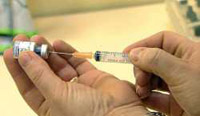EU calls for swine flu vaccine-sharing rules
 Luxembourg - The European Union needs clear rules on how member states can share stockpiled vaccines against the human A(H1N1) variant of the swine flu virus to overcome shortages in some member states, health ministers meeting in Luxembourg agreed Monday.
Luxembourg - The European Union needs clear rules on how member states can share stockpiled vaccines against the human A(H1N1) variant of the swine flu virus to overcome shortages in some member states, health ministers meeting in Luxembourg agreed Monday.
The European Commission, the EU's executive, should "propose transparent mechanisms whereby a member state willing to do it can make available vaccines to another member state in order to address the shortage of safe vaccine," ministers agreed in a statement.
The call from the emergency meeting comes as a number of countries, such as the Baltic states, Malta and Bulgaria, are struggling to put together sufficient stocks of vaccines to ward off a major swine flu outbreak.
Those countries should consider placing a joint order with pharmaceutical manufacturers in order to speed up the process, ministers said.
The need for a clarification in the rules derives from the fact that EU states must make sure that sharing supplies does not violate existing contracts with pharmaceutical companies.
The bloc is already grappling with the problem of "parallel imports," whereby wholesalers buy medicines in EU states where they are cheap and sell them in countries where they are more expensive, cutting into the manufacturers' profits.
Any rules on vaccine sharing should therefore "provide clarity on issues of (EU) law (...) such as those relating to competition law and liability," the statement said.
In the meantime, "member states with supplies (of vaccines) should share some limited amounts with those who do not have any," EU Health Commissioner Androulla Vassiliou said.
EU health ministers last held an emergency meeting on the outbreak of swine flu in April.
At the time, there were fears that the human version of the disease then emerging in Mexico could sweep across Europe with devastating consequences. Ministers agreed for the first time that they could share stocks of medicine if one country was particularly hard hit.
Governments had refused to do so during earlier public health scares, including bird flu and Severe Acute Respiratory Syndrome (SARS).
Since April, however, public fear of a massive flu outbreak has eased with the fast-track approval of three vaccines and the revelation that most of the victims of the disease quickly recover.
EU countries are now keen to spread the vaccines as widely as possible in a bid to make sure that the disease never manages to get a grip on the population.
The pandemic "hasn't hurt us as much as we thought, but we hope people will still want to have the vaccines (...) Experts have told us the pandemic will continue for some years," Sweden's health minister, Maria Larsson, said.
"If you protect yourself, that will be protection not just for the current situation and the nearest months, but the nearest years," she said.
Larsson chaired Monday's meeting, as Sweden currently holds the EU's rotating presidency.
Ministers in Luxembourg also agreed to inform the public about the latest health scare in an "accurate and consistent" manner, so as to avoid sending mixed signals to its citizens, Vassiliou said.
The commissioner said she had asked for an additional 4 million euros (5.9 million dollars) from the bloc's budget to help member states deal with the crisis. dpa